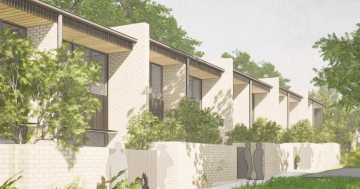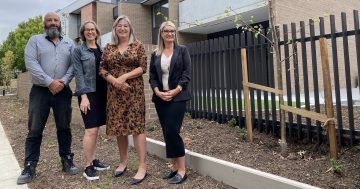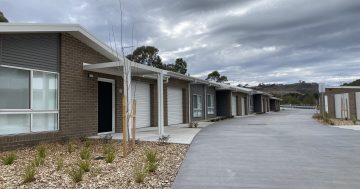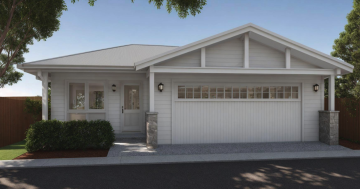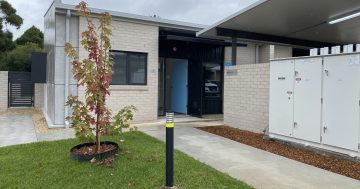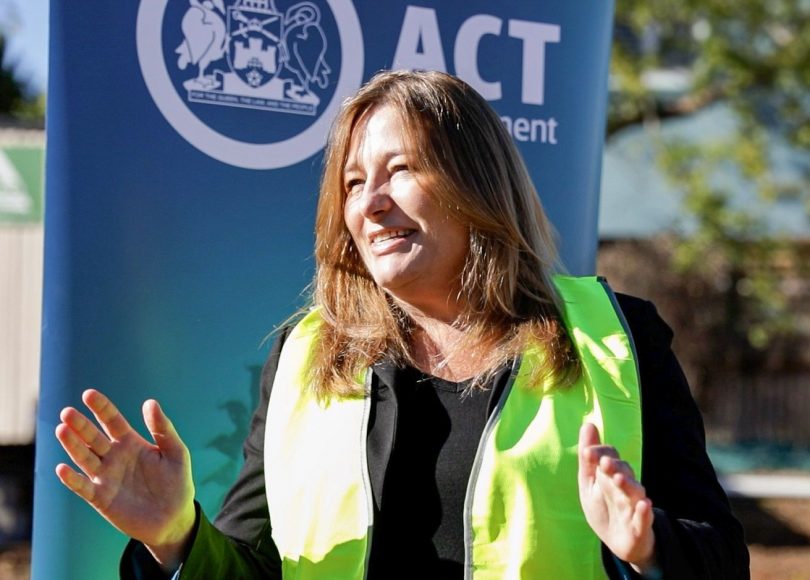
Housing Minister Yvette Berry on the site of new public housing development in Dickson recently. Photo: Supplied.
The ACT Government has gone to the market seeking social housing providers who can supplement its plans to boost and renew public housing in the Territory.
The Government wants to field a range of proposals for both land and buildings as it works towards its $650 million goal to build 400 new dwellings and renew 1000 properties by 2024-25.
Canberra’s tight and expensive rental market is exacerbating housing stress in the Territory, even for those who may have jobs but whose income is not high enough to afford private rentals.
Welfare groups including the ACT Council of Social Services say there is a shortfall of 3000 affordable dwellings in the ACT and has been calling on the Government to do more to alleviate the situation including providing additional land for affordable housing and boosting the supply of social housing from non-government providers.
The tender document says the 2018 ACT Housing Strategy provides a roadmap for the ACT for the next decade and a key element is a commitment to strengthening social housing assistance.
The two-stage Expression of Interest process covers six categories – land only, house and house and land packages including established dwellings under construction or in design to be built.
The other categories include multi-unit developments of no more than 30 residences, including established complexes, under construction or in design to be built; multi-unit developments where the proposal is for the sale of individual units in a larger development; and any other proposal that would meet Housing ACT’s needs.
The tender document says Housing ACT is seeking more appropriate accommodation configurations to meet the changing needs of tenants and better integration of social housing into the community.
It wants housing at the right price that is ‘fit for purpose’ and is cheaper to maintain and run with sustainable, energy-efficient and eco-friendly designs.
Properties that are adaptable and accessible will be preferred.
Housing ACT is particularly interested in replacement housing situated close to amenities and public transport.
It will look at single and multi-storey residences of two to six bedrooms including single and dual occupancy residences.
Multi-unit developments may include townhouses, units and/or apartments) of two to four bedrooms, including low-density developments of three to nine dwellings; medium density of 10 to 25; and high density, of more than 25.
If an entire complex is offered, a maximum yield of 30 will be required on one site, and where units within a larger complex are offered, no more than two dwellings per floor accessed by a single lift well will be considered.
Housing ACT will consider new or existing dwellings; knock-down, design and construct; design and construct and innovative proposals such as residential properties in mixed-use developments.
It will not look at studio apartments or bedsits, proposals requiring Territory plan or land use zoning changes or sites or dwellings in rural or industrial zones
“Providing an equitable, diverse and sustainable supply of housing for households at all income levels is a fundamental pillar of the strategy,” the tender document says.
“Across all stakeholders, community groups and industry professionals who were consulted during the development of the strategy, it was clear that housing pressure and stress points could be alleviated through a better supply of the right type of housing in the right locations.”
Housing Minister Yvette Berry said the government is doing its bit to ease housing pressures.
“The Growing and Renewing Public Housing program is increasing the portfolio’s flexibility to support the provision of safe, secure and sustainable homes that are close to services and transport for more people in need, regardless of their abilities or circumstances,” she said.













